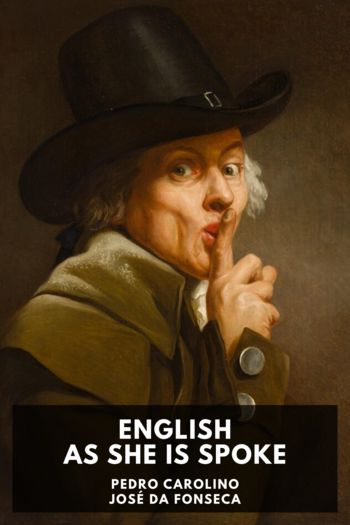Pablo de Segovia, the Spanish Sharper, Francisco de Quevedo [primary phonics .txt] 📗

- Author: Francisco de Quevedo
Book online «Pablo de Segovia, the Spanish Sharper, Francisco de Quevedo [primary phonics .txt] 📗». Author Francisco de Quevedo
I had not gone far before I spied at a distance a mule loose, and a man by her afoot, who looking into a book, drew some lines, and measured them with a pair of compasses. He leaped and skipped about from side to side, and now and then laying one finger upon the other, made several extravagant motions. I must confess, that stopping at a good distance some time to observe him, I at first concluded he was a conjurer, and was almost afraid to go on. At last I resolved to venture, and drawing near, he spied me, shut his book, and going to mount, his foot slipped out of the stirrup and he fell. I helped him up, and he said, “I took not the due proportion in rising, to make the half circumference of mounting.” I did not understand what he meant, but presently guessed what he was, for a more extravagant distracted man was never born of a woman. He asked whether I was going to Madrid in a direct line, or took a circumflex road? Though I did not understand him, yet I answered, “That by circumflex.” Next he asked me whose sword that was by my side? and having answered it was mine, he viewed it, and said, “That bar ought to be longer, to ward off the cuts that are made upon the centre of the thrusts.” And thus he went on, sputtering out such a parcel of big words, that I was fain to ask him what his profession was? He told me that he was a solid master of the noble science of defence, and would make it good upon any ground in Spain. I could not forbear laughing, and answered, “By my troth, sir, I rather took you for a conjurer, when I saw you describing circles, and making such antic motions in the field.” “The reason of that,” replied he, “was because there occurred to me a thrust in quart, fetching the greater compass, to engage my adversary’s sword, and killing him before he can say his soul is his own, that he may not discover who did it; and I was then reducing of it to mathematical rules.” “Is it possible,” said I, “that the mathematics should be concerned in that affair?” “Not only the mathematics,” quoth he, “but divinity, philosophy, music, and physic.” “I do not question it as to the last,” said I, “since that art aims at killing.” “Do not make a jest of it,” continued he, “for I will now teach you an excellent guard, and at the same time you shall lay on the great cuts, which shall contain the spiral lines of the sword.” “I do not understand one word of all you say,” answered I. And he again, “Why, here you have them in this book, which is called, The Wonders of the Sword.13 It is an excellent one, and contains prodigious things; and to convince you of it, at Rejas, where we shall lie tonight, you shall see me perform wonders with two spits; and you need not question but that whosoever reads this book, will kill as many as he pleases.” “Either that book teaches men how to make plagues,” replied I, “or it was written by some doctor of physic.” “What do you mean by a doctor?” replied he. “He is an extraordinary wise man, and I could find in my heart to say more.”
We held on this ridiculous discourse till we came to Rejas, and went into an inn; but as we were alighting, he called out to me as loud as he could, to be sure first to form an obtuse angle with my legs, and then reducing them to parallel lines, to come perpendicularly to the ground. The landlord seeing me laugh, did so to, and asked me, “Whether that gentleman was an Indian, that he spoke in such a sort.” I thought I should have died with laughing between them; but he presently went up to the host, and said, “Pray, sir, lend me a couple of spits to make two or three angles, and I will restore them immediately.” “Lord bless me, sir,” answered





Comments (0)